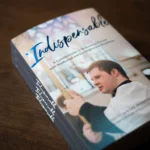
As many of you may know, I am the president of the board of Autistic Catholics. Our wider goal is autistic inclusion in the Church. Our initial short to medium-term goal is promoting small groups of autistic individuals. Towards this end, we are working on compiling a small group guidebook for parishes, dioceses, etc. Several of us on the board are working on this: I’m reading up on autistic psychology and small-group dynamics along with my extensive knowledge of Catholic spirituality and theology.
However, I want to know what autistics want in a Christian small group with fellow autistics. Please reply below. I moderate comments, so if you prefer anonymity, say that in the first line, and I’ll share the comment with the team anonymously.
“Small group” refers to a group of about 4 and 18 Christians who meet regularly to discuss faith. Pray groups would also be included. This would include groups like Bible study or Christian book study, along with groups of more open discussion or more like support groups for living as an autistic Christian in this neurotypical normative unchristian world. I hope to write general principles and also list different modalities in the guidebook.
We are looking at both autism-specific small groups and including autistics in other small groups. So feel free to comment on both.
Feel free to share any ideas. I want individual experiences, things you wish small groups you were involved with had, or hopes you would have for such groups. At this point, I am more looking to brainstorm than to write the specific text. We will edit it later.
I hope we at Autistic Catholics can have at least a first draft this year. I also hope to present this to a more general Christian audience at the Institute for Theology and Disability this year. We might see each other there.






If It’s Bible study, I want to be in a group with an expert, maybe a priest. If I have questions, I want to have faith in the answers. I’m worried about listening to other people’s misinterpretations of important things.
Carved out time to discuss awkward social interactions. As someone with aspergers, I frequently (and this was worse when I was younger) have interactions where things don’t go well. One time, my dad pulled me aside after a family Christmas party and said “You mad a serious mistake with how you talked to your grandmother.” I kinda understood what he said, but I also didn’t.
The best way autistics can learn social skills is when people sit them down and explicitly explain the rules of what is acceptable and what isn’t, especially the “unwritten” ones. Very often this feels “unrelated” to Catholic/faith-based things.
Also how to set boundaries and not let criticism that isn’t warranted “in” EVEN when it’s from Catholic leaders — How to speak truth to power when Catholic leadership is wrong.
1) a name badge system that signals what everyone’s engagement level. Like red could be the person wants to sit and listen and not have anyone talk to them, green means they want to talk/engage. 2) a way to ask questions later from the group leader. Sometimes we need to think/process for a day or two. 3) provide and/or allow prayer beads so we can fiddle with/stim while paying attention. 4) please be ok if we don’t face/look at the leader. It seems obvious, but people do not understand that we can process whats being said or we can engage socially – but we can’t always do both. 5) if you provide snacks,
we typically prefer salted snacks over the sugary stuff 6)we often have weird bathroom needs. Please don’t draw attention to this – its already hard enough that our guts are throwing us a curve ball. I would also suggest seeing if ASAN to look over the final guide before printing.
An adolescent and young adult group of autistics on learning how to treat the opposite gender as Jesus wants us to, and how to date, the Catholic way, in this day and age.
For autistic children, a group where they are taught abstract morality in a concrete manner. Also, teach them the timeline and visuals of people in the Bible. Also discuss family dynamics and how to live the Catholic way.
Perhaps ask for a marriage and family therapist to volunteer.
As someone interested in catechetical pedagogy and with a doctorate in moral theology, I see this for autistic kids most, but also a lot for non-autistic kids: “a group where they are taught abstract morality in a concrete manner.”
Also, practicing emotional regulation when things don’t go as expected. Learning what coping skills they can use.
Not Catholic but I am Protestant. I’m also adhd as well as autistic. Small group sizes where there is space to ask the questions that arise from reading a text literally (like a recent conversation I had during a Bible study about living water not actually being water on legs…). Having a knowledgeable leader who can handle those questions, and who is careful when talking about Christian lifestyle rules and expectations because these will also be taken strictly and literally. Also, a way to channel the strong sense of justice that often comes with neurodivergence from anger at the faults or inconsistencies in the church, to the problems of sin in a broken world. Stable group members so that we know who will be attending. Neurodivergent seating options- not being expected to sit still on a seat. A predictable pattern for how the study runs.
Thank you. I appreciate non-Catholic perspectives here. When talking about liturgy, we may be a little further apart, but I think on this we are quite close.
One of the things I love about Catholicism is that we worship Truth Himself, the Divine Logos who gives order to the universe. I am not drawn to various saints’ devotions, medals or relics, and I am somewhat off-put by anything sentimental. It is good that God provides those things for people who get something out of them, but they do little for me.
When I was younger, I really wanted to talk to more experienced Catholics about the logical side of things, like “how do I prove that God exists” or “do angels exist within or outside of time-space” or “can the saints hear our thoughts”, but most of the people I tried to have those conversations with either avoided the question or gave emotion-based answers. I actually had a breakdown at one point because every person I turned to for answers gave me nonsense that made me question my faith. I ended up buying and reading a lot of books, and thankfully I found a friend who was as passionate about seeking answers as I was, and a couple others who were supportive in other ways.
I know there is still a lot to learn about the Faith, and I’m still looking for places to learn it. I gave up trying to learn from youth groups after I went on a college retreat, and instead of teaching about the Church Fathers or reading the Bible, they were teaching stuff anyone should know by their first communion, like what the Rosary is and how to say one. The only edifying conversation I had was during break time, and that was interrupted to make us all go do some activity that was similar to an “ice-breaker”. The one part of the retreat that I really benefited from was Adoration, but every time I managed to settle into meditation, someone would start playing guitar and break my concentration. It was infuriating, and I still don’t understand why they would do that. Isn’t the whole point to enter into deeper prayer? They had the whole rest of the weekend to play guitar and sing.
So there’s two things. Educated teachers who aren’t afraid to discuss hard questions (and who will honestly admit when they don’t know something or look it up), and a total ban on noise during Adoration.
I would like to see orthodoxy and have it be a faithful Catholic space free of the cultural Marxism and queer theory that often is found in the secular neurodivergency movement. Not that it should be unwelcoming to those who struggle with non-straight sexual attractions or gender questionings, but have it provide answers that are an alternative to what the progressive narrative offers.
Also, for ADHD and AuDHD and those who aren’t sure if they are autistic and may not want to pursue formal diagnosis but can relate to enough of autism for whatever reason to have a desire to participate and learn coping skills and life pro tips.
Perhaps some help too for those who struggle with scrupulosity and/or OCD neurodivergency – how to trust in a loving God and not get tangled up in scruples. How to avoid the rigid thinking that can lead to scrupulosity and have more confidence making tricky moral decisions in the grey areas.
To have a group of autistic Christians in my area would be nice. A group that doesn’t condemn me when I’m too burned out after work to attend but, cares about me. The option of doing meetings on zoom.
If you have an autistic only group I’d try to find a leader who has autism themselves or at least knows someone with it. If they don’t have autism or know anyone then they would basically have no potential to be leader. Someone with autism especially Asperger’s has no issues reading the Bible or Christian books or listening to sermons and Bible studies. What they need is to understand what God wants them to do with their lives. That’s not an easy question to answer for anyone( I hear ) let alone someone who may not have any friends,job,societal acquaintances,societal acquaintances who also are on the spectrum,a girlfriend or wife,children,or maybe even family members that support them for instance if they live on SSI in a group home. And even if they have any family members that help them it’s likely few and fleeting either because their neurotypical relatives slowly get annoyed because they don’t understand or some lack of character on their part or because their family members are getting older and less able to help them with cleaning, laundry,job advice,and/or emotional support. In the US it’s actually easier for people with physical disabilities and also people with down syndrome to get jobs than anyone on the spectrum including high functioning people because those conditions are much more visible and simpler to understand than autism at any level. The Bible says to be a good worker,and be fruitful,and that it’s good to have friends but those are difficult for an autistic person. Basically the group the leader absolutely must have or know someone closely with autism. You wouldn’t expect the leader of a cancer survivor group or an AA group to have only read books which may or may not be accurate about cancer or drinking would you? And as far as grouping people with autism into a group with other neurodivergent people I just think that’s not a good idea at all because I think all different mental conditions shouldn’t be lumped together as if they have any relation to each other. What does adhd have to do with schizophrenia for instance? Nothing at all and they also are on two different levels of severity in every case without exception it’s apples and oranges. I think all mental conditions should have their own groups period. And if someone has multiple conditions than they can go to the different meetings they need to.